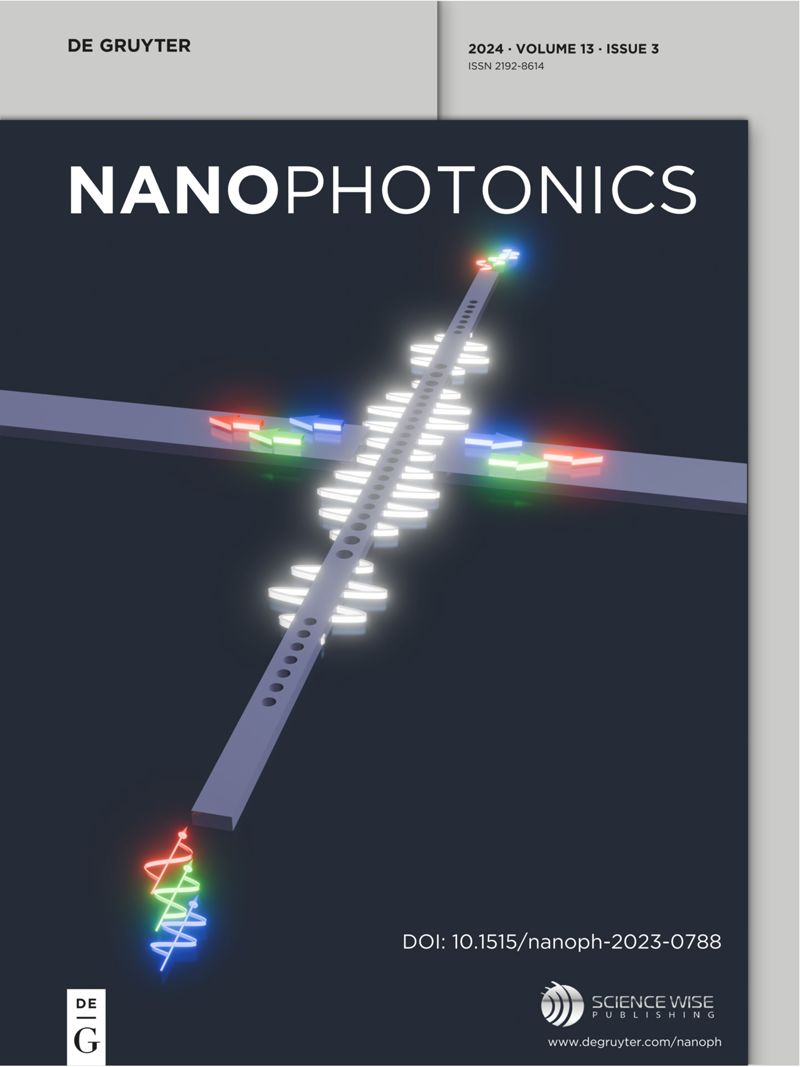Dynamic nonlocal metasurface for multifunctional integration via phase-change materials
IF 6.5
2区 物理与天体物理
Q1 MATERIALS SCIENCE, MULTIDISCIPLINARY
引用次数: 0
Abstract
Non-local metasurface supporting geometric phases at bound states in the continuum (BIC) simultaneously enables sharp spectral resonances and spatial wavefront shaping, thus providing a diversified optical platform for multifunctional devices. However, a static nonlocal metasurface cannot manipulate multiple degrees of freedom (DOFs), making it difficult to achieve multifunctional integration and be applied in different scenarios. Here, we presented and demonstrated phase-change non-local metasurfaces that can realize dynamic manipulation of multiple DOFs including resonant frequency,通过相变材料实现多功能集成的动态非局部元表面
非局部元表面支持连续体中束缚态(BIC)的几何相位,可同时实现锐利的光谱共振和空间波前整形,从而为多功能设备提供多样化的光学平台。然而,静态非局部元表面无法操纵多个自由度(DOF),因此难以实现多功能集成并应用于不同场景。在这里,我们介绍并演示了相变非局部元表面,它可以实现多个 DOF 的动态操控,包括谐振频率、Q 值、频带和空间波前。因此,作为概念验证演示,我们设计了一种集成多种不同功能的元表面。利用准 BIC 的几何相位和二氧化钒(VO2)的可调谐性,在从室温到 53 °C 的温度范围内,通过定制准 BIC 的空间光响应,实现了动态元透镜。同时,准 BIC 的尖锐法诺共振使元表面能够作为中红外波段的光学传感器,在室温下产生 7.96 THz/RIU 的灵敏度。此外,在 VO2 的金属态(80 °C)下,所设计的元表面可转化为中红外宽带吸收器,在 28.62 太赫兹到 37.56 太赫兹之间的吸收率超过 80%,平均吸收率达到 90%。所提出的能在不同温度下实现多功能性能的元表面能有效提高器件的可用性,并在传感、成像和通信领域找到更多新的复杂应用场景。
本文章由计算机程序翻译,如有差异,请以英文原文为准。
求助全文
约1分钟内获得全文
求助全文
来源期刊

Nanophotonics
NANOSCIENCE & NANOTECHNOLOGY-MATERIALS SCIENCE, MULTIDISCIPLINARY
CiteScore
13.50
自引率
6.70%
发文量
358
审稿时长
7 weeks
期刊介绍:
Nanophotonics, published in collaboration with Sciencewise, is a prestigious journal that showcases recent international research results, notable advancements in the field, and innovative applications. It is regarded as one of the leading publications in the realm of nanophotonics and encompasses a range of article types including research articles, selectively invited reviews, letters, and perspectives.
The journal specifically delves into the study of photon interaction with nano-structures, such as carbon nano-tubes, nano metal particles, nano crystals, semiconductor nano dots, photonic crystals, tissue, and DNA. It offers comprehensive coverage of the most up-to-date discoveries, making it an essential resource for physicists, engineers, and material scientists.
 求助内容:
求助内容: 应助结果提醒方式:
应助结果提醒方式:


